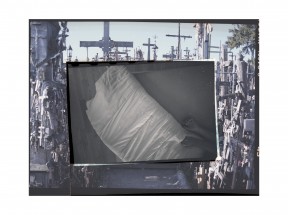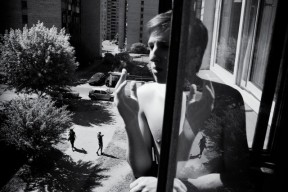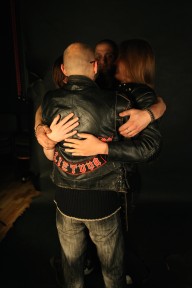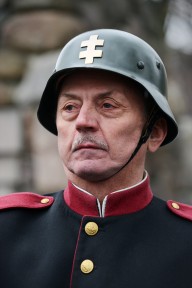Paroda Rygoje
Starting March 30 till April 5 photo exhibition curated by T. Pabedinskas was staged at the Latvian University in Riga. The exposition titled “National Identity in a Global Village” included four authors, who question what forms of national identity are still relevant in a world, where media, communication, travel and migration cross all boundaries and often erase identity characterized by difference. Each author of the exhibition seeks his own answer and expresses his search for national identity in a different form.
Romualdas Požerskis – the famous representative of Lithuanian humanist photography – documents rituals of Lithuanian Shooters Association. The members of this society gather to raise the flag in a town square every weekend. Lithuanian Shooters Association continues their traditions dating back to interwar period and associate national identity with the independent state and its military force. R. Požerskis photographs this ritual in his own style – capturing the real action, looking for distinctive characters and trying to express their psychology.
Tomas Pabedinskas presents photographs from an interdisciplinary project “(Sub)Culture”. The project consisted of studio photographs of representative of various subcultures and many interviews done by Rasa Pranckevičiūtė – a researcher in cultural studies. The exhibition presents photographs of bikers and skinheads – subcultures closely related to the notion of national identity and patriotism. The photographs reveal these values through external signs in personal image, which is documented in a objective, unassuming way.
Media artists with a background in fine arts Rimantas Plungė and Remigijus Venckus distance themselves from “straight” photography and use photography as one of the media for their creative projects. They use photography to express their subjective relation to other people or the world around them and to explore the media itself. R. Venckus creates a kind of personal and intimate visual diary. National and personal identity is associated with author’s immediate family, friends and place where he grew up. The remembrance of native places and personal experience is more important than the national state in this case. R. Plungė superimposes the images of the Hill of Crosses (famous sacral location in Lithuania) with the fragments of everyday life. His works raise questions about how much Lithuanian identity is formed by traditions and national myths and how much it is influenced by mundane reality. The works provokes the feeling of the discrepancy between the ideal and the real.




